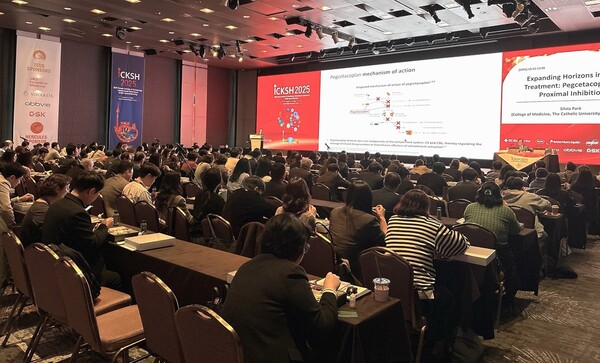The paroxysmal nocturnal hemoglobinuria (PNH) drug Empaveli (pegcetacoplan), introduced in Korea last year and currently covered by health insurance, has been confirmed as a treatment option for the unmet medical need of extravascular hemolysis.
Handok, which launched Empaveli in Korea last year in collaboration with global pharmaceutical giant Sobi (Swedish Orphan Biovitrum AB), held a satellite symposium at the International Congress of the Korean Society of Hematology 2025 (ICKSH 2025) on Thursday to share the latest advances in the treatment of PNH and the clinical effectiveness of the new treatment, Empaveli.

At the symposium, “Expanding horizons in PNH treatment: Pegcetacoplan in proximal inhibition,” Professor Lee Je-hwan of the Department of Hematology-Oncology at Asan Medical Center chaired the session and Professor Silvia Park of the Department of Hematology at the Catholic University of Korea Seoul St. Mary's Hospital participated as a speaker.
The presentations covered the current status of PNH treatment, unmet medical needs, and clinical data on Empaveli, the first proximal inhibitor in Korea.
“Although significant progress has been made in the treatment of PNH with the development of C5 inhibitors as first-line therapies, there has been an unmet medical need for extravasation hemolysis,” Professor Park said. “Since C5 inhibitors only work on intravascular hemolysis, there is a persistent anemia or need for blood transfusion due to extravasation.”
Between 23 percent and 52 percent of PNH patients require transfusions due to residual intravascular hemolysis (IVH) and new extravascular hemolysis (EVH), which can impact the quality of life of PNH patients.
In the PEGASUS trial, a phase 3 study in patients previously treated with eculizumab, Empaveli demonstrated superiority over eculizumab in terms of change in hemoglobin concentration over 16 weeks.
In the Empaveli arm, mean hemoglobin levels increased by more than 2.37 g/dL from baseline, and 85 percent of patients remained transfusion-free for 16 weeks in the Empaveli arm, compared to 15 percent in the eculizumab arm. Empaveli also showed significant improvements in absolute reticulocyte count, bilirubin, and LDH levels, with benefits lasting up to 48 weeks.
In addition, a retrospective analysis of Japanese patients in the PEGASUS trial demonstrated a similar safety profile for Empaveli in Japanese patients compared to the global population, with no sudden hemolysis events. All Japanese patients were treated continuously throughout the study with no dose adjustments and had favorable safety outcomes.
“To address the unmet medical need for PNH treatment, Empaveli, which acts on intravascular and extravascular hemolysis, was developed and has been available in Korea since last year,” Professor Lee said. “It could be a new treatment option to consider for patients who have an insufficient response to C5 inhibitors.”
Related articles
- Handok secures approval for ITP treatment Doptelet
- Novartis' oral drug Fabhalta rises as strong contender in PNH market
- Handok's rare blood disorder treatment Empaveli wins insurance coverage
- [ICKSH 2025] ICKSH expands beyond Asia, attracts experts from US and Europe
- [ICKSH 2025] ‘Multiple myeloma patients must know about their disease. Our working party will help.’
- [ICKSH 2025] CAR-T therapy reshapes lymphoma treatment amid new strategies and resistance challenges
- [ICKSH 2025] ‘Don't let treatment kill the patient before the disease does’: Mayo Clinic doctor
- [ICKSH 2025] ‘Ph-like ALL treatment paradigm shifting toward molecularly guided immuno- and targeted therapy’
- [ICKSH 2025] ‘Advancing genetic insights to refine treatment strategies for Down syndrome-associated myeloid leukemia’
- [ICKSH 2025] ‘High-risk pediatric AML needs precision, not more chemotherapy’
- [ICKSH 2025] Reimbursement policy determines success or failure of blood cancer treatment
- [ICKSH 2025] CD38 at a crossroads of immune modulation and therapeutic innovation
- [ICKSH 2025] CML therapy moves toward precision with asciminib and genomic profiling
- [ICKSH 2025] CML care enters new era with next-gen sequencing: experts at ICKSH 2025
- [ICKSH 2025] Molecular insights and targeted therapies take center stage in AML care
- [ICKSH 2025] Basic principles of AI and its application in healthcare
- [ICKSH 2025] Spotlighting cutting-edge diagnostic technologies in hematology

